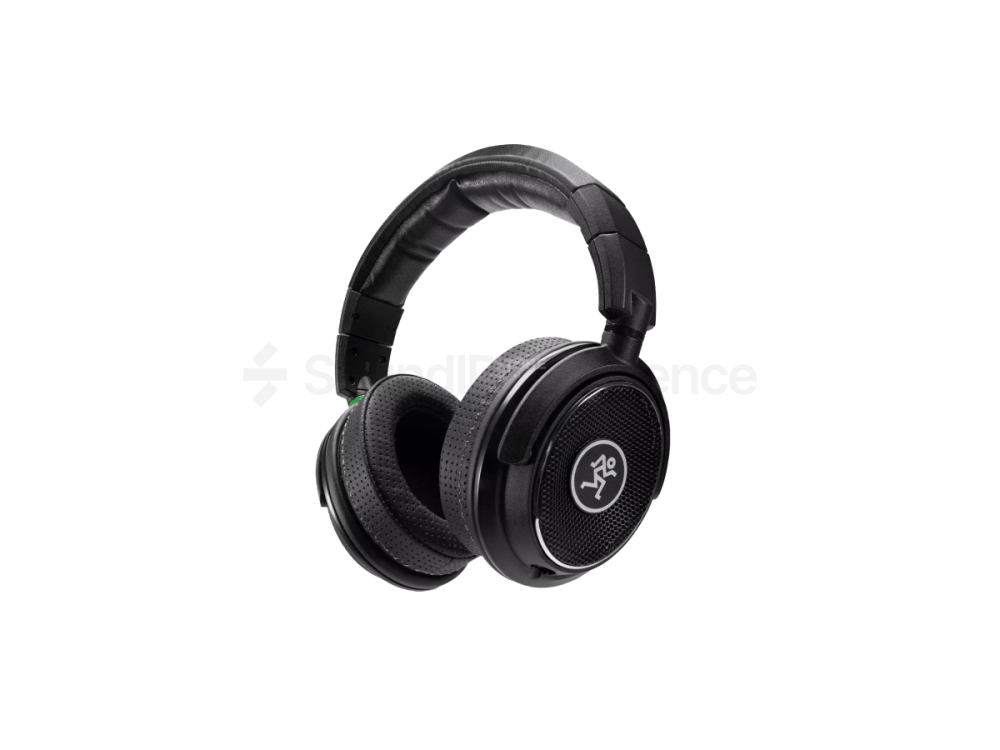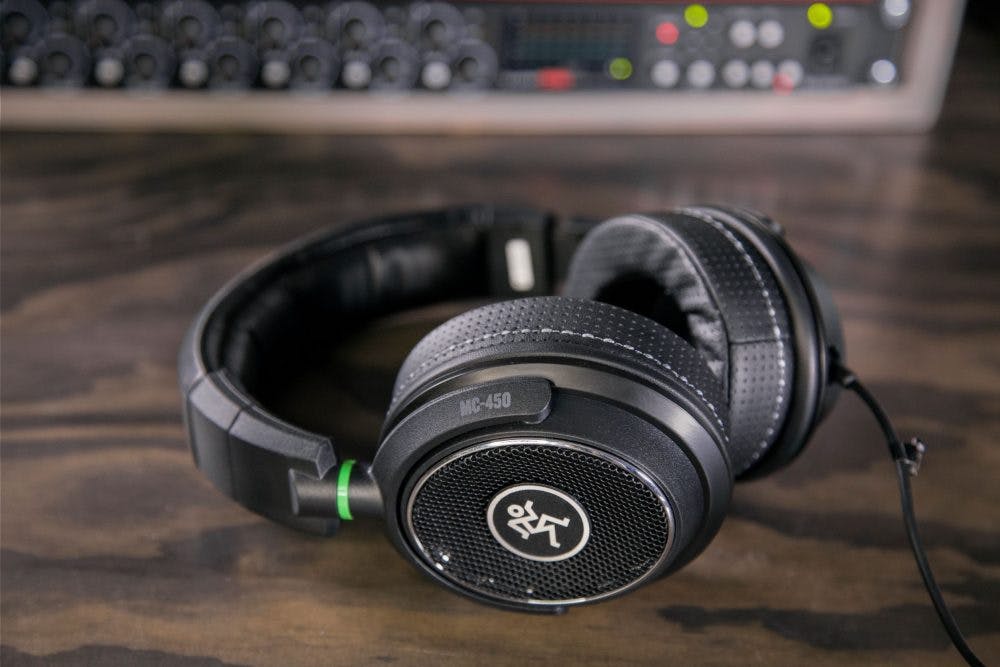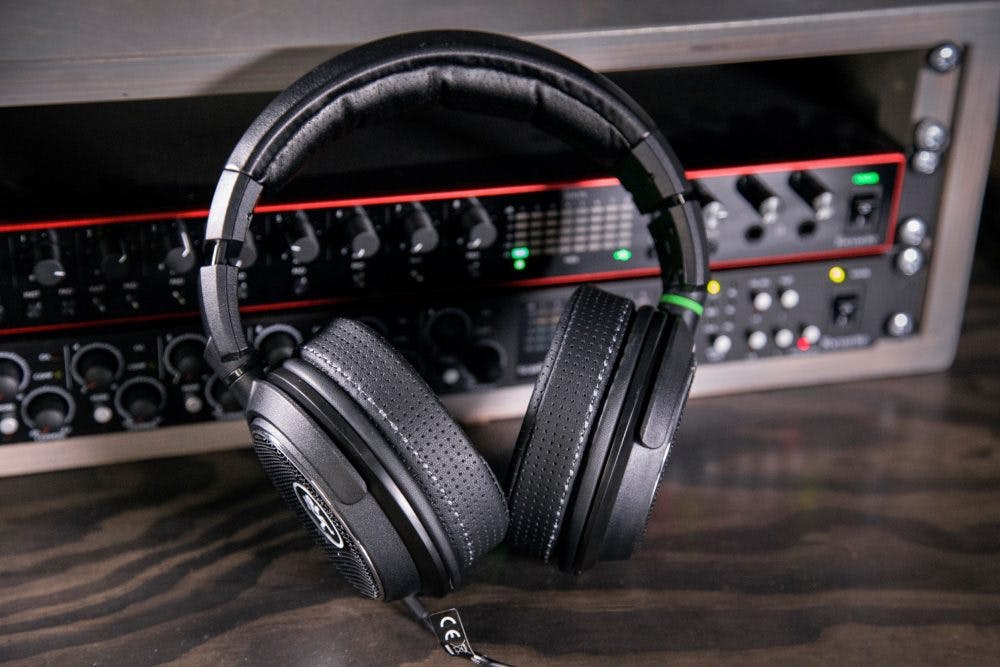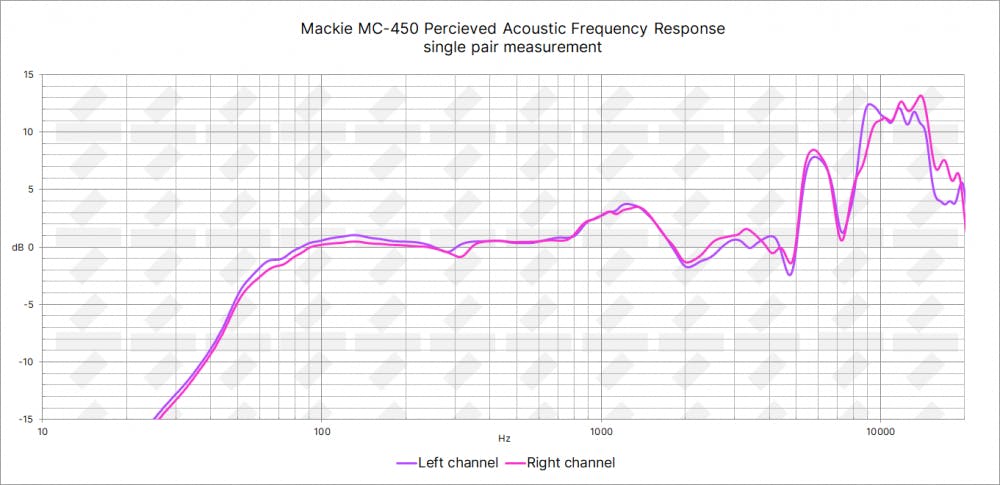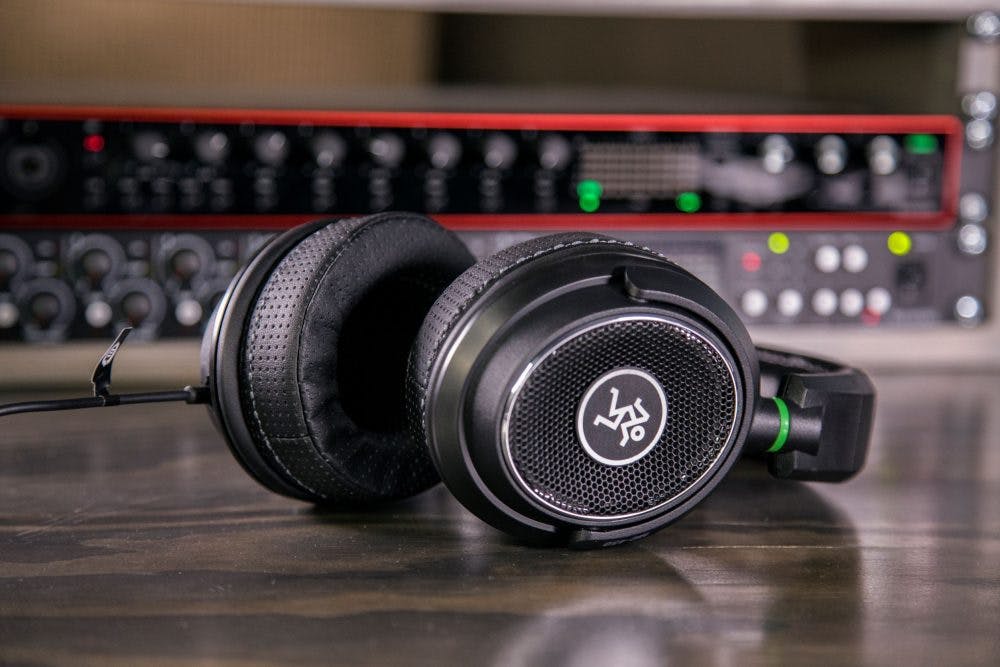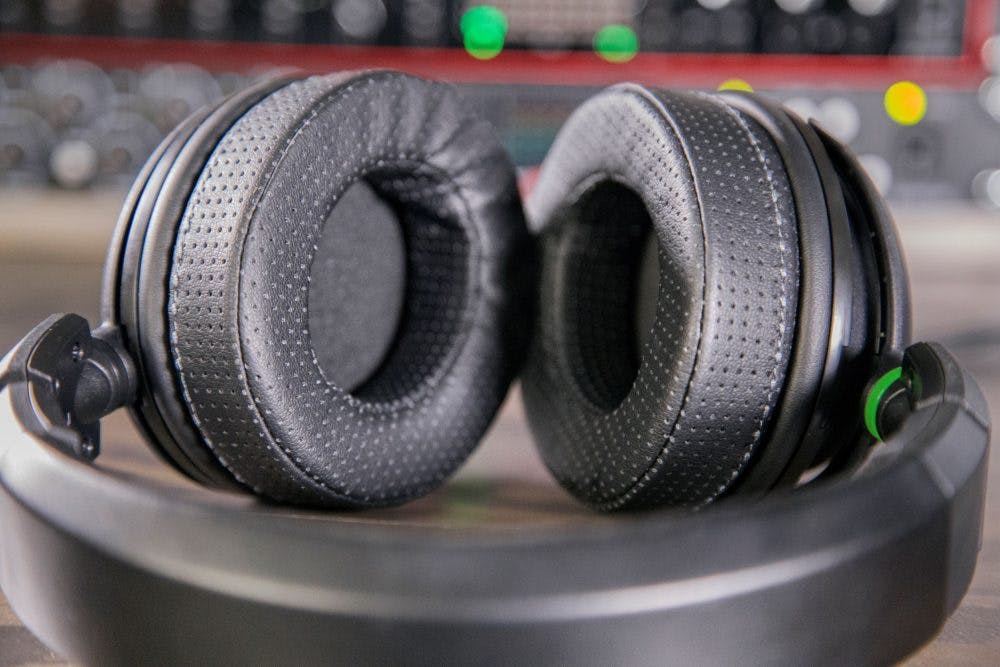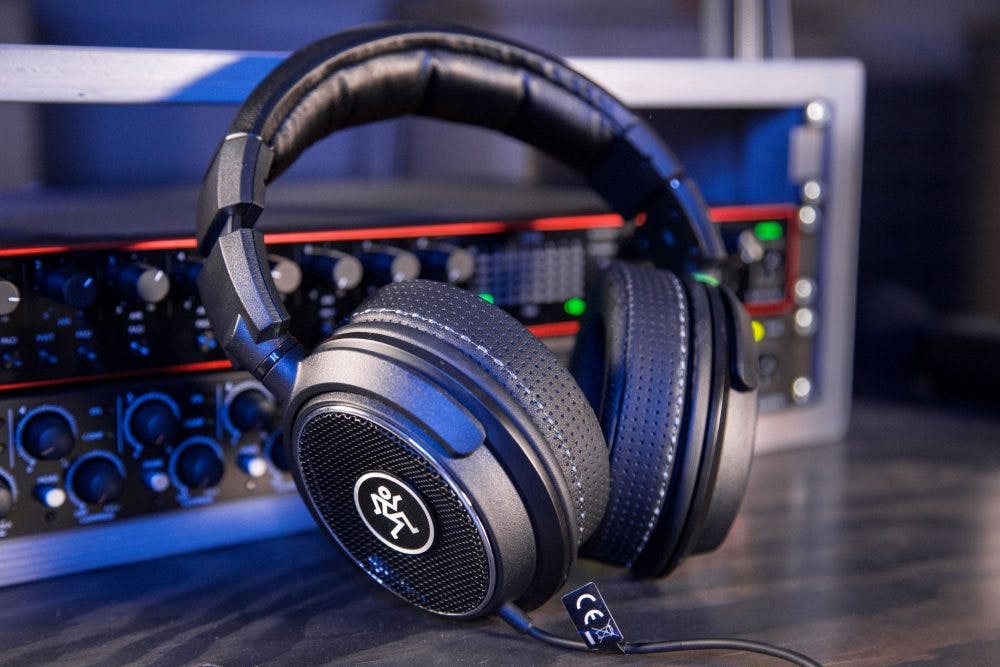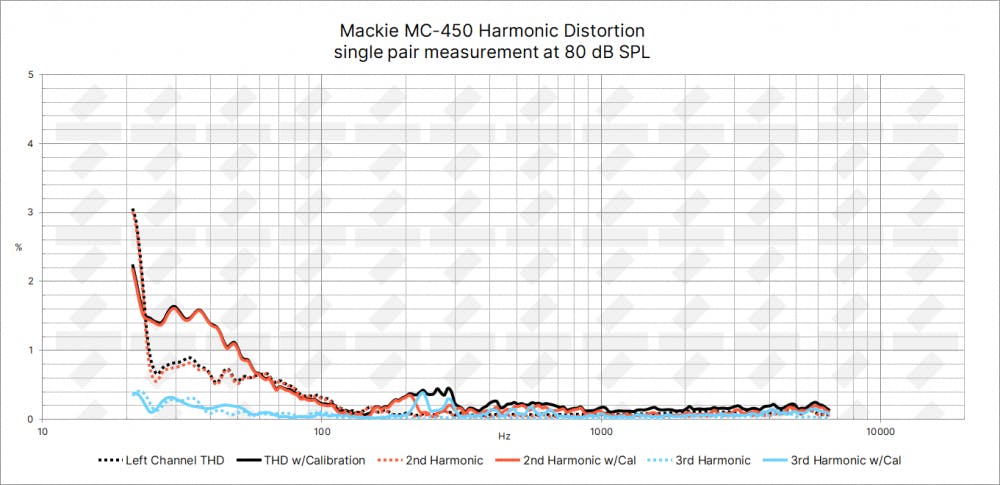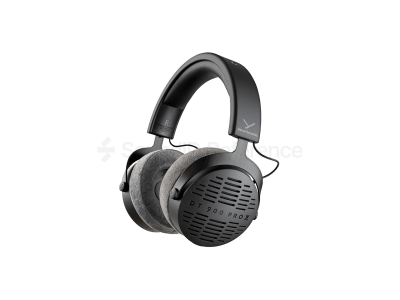Mackie has entered the studio open-back arena with the MC-450. We liked the more affordable closed-back MC-250 quite a lot, so we’re excited to see what Mackie flagship can do. However, the MC-450s price puts them in an entirely different league than the MC-250s, they are competing against some of the best headphones ever made. So can they deliver?
- Very evenly matched channels
- 3 cables to choose from
- A protective case included
Pros list with SoundID Reference calibration
- Increased sub bass extension
- Neutral frequency response
- Relatively heavy
- Stiff competition
The not-so-high impedance of 54Ω and included phone-friendly cable with the integrated mic suggests that these headphones might pair well enough with mobile devices, yet, weirdly, this isn’t the case. When connected to a laptop even at the max volume they may leave you wanting for more volume. And since calibration introduces a significant volume drop of more than 11 dB, you can pretty much forget about using them calibrated with mobile devices.
In hands MC-450 feel quite more robust than they look, perhaps the relatively hefty weight plays a part in it. The extra thick leather headband feels nice and premium, yet most of the rest of the build is plastic, the kind that doesn’t feel adequate for $300 headphones. Also, there’s a bit of weird juxtaposition between the real leather headband and faux-leather earpads. Some other recently released headphones feature attractive materials that are great to touch, however, MC-450 feels more in line with the utilitarian headphones of the past, like DT 990 PRO, not the new DT 900 PRO X. Yet these things are rather subjective, objectively there’s nothing wrong with the build.
We’ve seen no other studio open back headphones shipped with such cable choice! There’s a rather standard 1.22 meter long coiled cable that neatly locks in the earcup, a nice 3 meter straight cable that’s braided and features the same lock, and the third one got me scratching my head at first–a 3.5 mm cable with a mic and remote. For headphones that can be barely driven by mobile devices. But after giving it some thought, it might come in handy in the new reality of very frequent conference calls.
A great addition is the case for transportation and storage, which will do a great job of protecting MC-450s.
The sub bass extension is not great as expected with dynamic open backs, however, these Mackies do a great job from about 70Hz to 800Hz, as they’re pretty much flat in that bass to low-mid region. Moving higher up the frequency range, at about 1kHz – 3kHz a noticeable coloring starts to happen, but it’s still nothing when compared to the elephant in the room–these headphones are BRIGHT! At about 10kHz the increase reaches 12dB. The bright sound signature is further amplified by the lack of sub bass. These are some of the brightest studio open backs that you’ll find. Nevertheless, all these issues can be dealt with using SoundID Reference, MC-450 can handle the calibration beautifully!
When it comes to channel matching, Mackie MC-450 can go against the best of them! There are borderline negligible channel differences on the worst pairs and the best pairs, well, they’re pretty much perfect.
Usually, headphones feel nice when you put them on, but after some time they become uncomfortable. With MC-450 though, few testers reported the opposite to be true. At first, they may feel heavy and a bit tight, yet with time they no longer feel that way and can be worn for very long periods without issues. Besides the plush ear pads, balanced clamping force and comfortable headband design, one factor contributing to this may be the headband adjustment mechanism that offers very fine adjustment with 23 clicks on each side, so everyone can dial in the fit just right. Also, the perforated pleather earpads when matched with the open back design lead to a very well-ventilated design, so heat buildup over time is less of an issue.
The whole package brings quite a lot of value. At this price point, no other open back comes with a selection of 3 cables and a protective case. None of the closest rivals match that, both the more affordable ones and those that are more costly. The less expensive AKG K612 Pro and Beyerdynamic DT 880 Pro don’t even feature a detachable cable! On the other hand, when it comes to sound, both have a slight edge over the MC-450. Furthermore, at €264 in Europe the price of these Mackies is approaching that of the Audio-Technica ATH-R70x and Sennheiser HD 600, while being $300 in the States, it’s way above HD 6XX…
It appears that Mackie has really done their homework when developing the driver for their top-of-the-range open backs. The bass remains clean-sounding even with the calibration enabled and volume cranked up to dangerous levels. On graphs, the THD performance is better than all of its rivals, and it proved to be great in listening tests as well, yet there’s really no audible difference between MC-450 and HD 650, despite the THD figures being way higher for the latter.
How accurate and consistent is the correction effect among different listeners?Adaptiveness is overall very good, yet it’s not as great as with Beyerdynamic DT 880 Pro or any of the Sennheiser HD 650 related models. The response among listeners will vary in the very top end and to a lesser degree in the bass as well, while the mids should sound consistent for most.
How much do they differ pair to pair in terms of frequency response?Consistency is great throughout the mid and high frequencies, yet there’s a bit of variance at the very low end, spanning about +/-2.5 dB. That’s a noticeable difference and can make the bass monitoring less accurate when used with the SoundID Reference model average profile.
Overall, when it comes to mid and high frequency consistency among pairs, MC-450s are on par with Beyerdynamic DT 880 Pro and Sennheiser HD 650 (and the related Sennheiser models), but bass consistency is worse than rivals.
Rating
Conclusion
Mackie MC-450 are very good open-back studio headphones for mixing and mastering once paired with SoundID Reference. The manufacturing consistency seems to be held to a high standard and is among the best we’ve seen. If you tend to carry your headphones with you, the added protective case will be a welcome addition. There’s a lot to like, but the same can be said for AKG K612 Pro, Beyerdynamic DT 880 Pro and Sennheiser HD 650 (and the related models). Adaptiveness is what sets these models apart from the MC-450. When used with SoundID Reference, Mackies will not be as accurate, by a small margin, but the difference is there. The Mackie team has done a great job with the MC-450, but it’s not beating the best.
Final Rating
Calibration Enabled
Calibration
